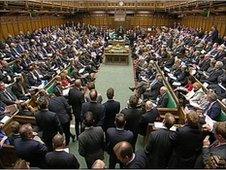Popular petitions could influence laws, says government
- Published

The changes will allow voters and MPs to engage more, the government says
Demands made in the most popular public petitions could become the basis of new laws, the government has said.
Leader of the Commons Sir George Young said petitions which attracted at least 100,000 signatures could trigger debates and votes by MPs and peers.
Government bills should also go through a "public reading stage" as they progress through Parliament, giving voters greater scrutiny, he said.
MPs and peers will decide how such schemes are to work, Sir George added.
The Conservative-Liberal Democrat coalition has promised the "biggest shake-up of our democracy" in 178 years, including asking the public to nominate laws to be repealed, as part of a "power revolution".
'Cost-effective'
Answering a written Commons question from Lisa Nandy, Labour MP for Wigan, Sir George said: "The government will bring forward new proposals for the public to engage with the House by submitting petitions which will be eligible for debate if they obtain 100,000 signatures, with the petition which attracts the most signatures triggering an opportunity for a bill to be presented.
"We will also bring forward proposals for a new public reading stage of government bills."
Currently, government proposals are put to the public for consultation - in the form of green and white papers - before bills are framed.
The changes would give people some input during the passage of legislation through Parliament, currently the preserve of MPs and peers.
Sir George said: "There is clear scope for these proposals to be taken forward together, and in cooperation with the House's wider work on public engagement, in order to ensure that they are implemented in a way that is consistent, coherent and cost-effective."
But the "final decision" on their workings would be made by parliamentarians, he added.
The previous Labour government introduced online petitions on the 10 Downing Street website, but these have not been debated by MPs.
- Published11 June 2010